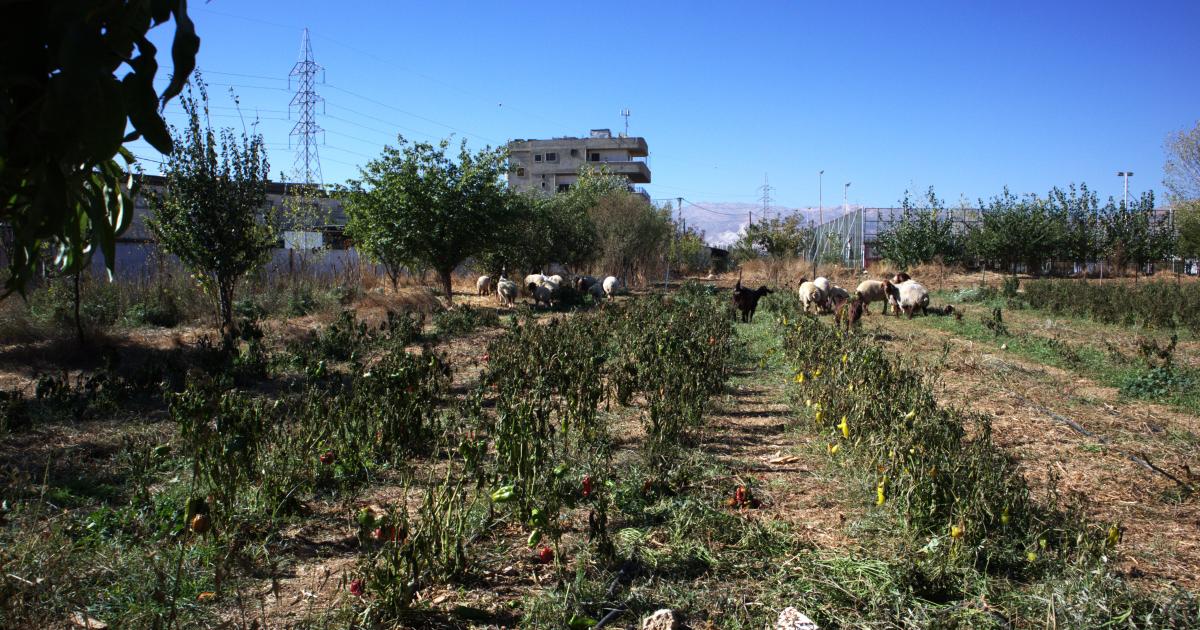These attacks, deemed war crimes by international NGOs, have also destroyed 1,900 hectares of farmland and rendered another 1,200 hectares abandoned.
Lebanon has lost 47,000 olive trees, thousands of animals in livestock, and 1,200 hectares of forest. “Olive trees have always been targeted because they are deeply tied to the land and its people,” says Nagham Khalil, a communications officer at Jibal, an NGO researching agroecology and supporting farmers. “Destroying them erases history.”
Bombardments
Ahmad Mohammad Daoud, another Syrian farmer displaced from southern Lebanon, now rents an unfinished house in Saadnayel for $150 USD (£118) a month . “We had to abandon everything—our crops, our livestock,” he says. “The land is so damaged it may take two or three years to become fertile again.”
Just kilometers from the Choujas’ makeshift shelter lies the Bujurna Juzurna organic farm, where they once trained. The farm employs 20 people from Lebanon, Syria, and France, produces crops according to organic principles, and maintains a seed bank. Recently, a nearby house was bombed.
“We sort chickpeas here,” says Serge Harfouche, one of the farm’s founders. “Some are replanted, while others go to ten community kitchens feeding displaced people nationwide. We can sustain this effort for now, but how much longer?” The founder explains that they can sustain this activity until, at the latest, the end of December.
The war jeopardizes access to fields and Lebanon’s fragile food security. At another nearby plot, 25 hectares are slated for wheat and other staple crops. Bujurna Juzurna’s team had a chance to plow the soil and hopes to sow in the coming days.
But even after that, with the ongoing war and bombardments, more frequent every day, it remains a question mark on how they will maintain their activity in this part of the Bekaa Valley.
Munitions
Israel’s bombardments are targeting Lebanon’s farmland, campaigners say, threatening the livelihoods of countless families already struggling in an unprecedented economic crisis which has been ongoing since 2019.
“These attacks severely undermine food sovereignty,” says Angela Said, a program director at Jibal. Even before October 7, 2023, Lebanon relied on imports for 80 per cent of its food, with 82 per cent of its population living below the poverty line.
“If Lebanon were better prepared in terms of food security and if farmers were more collectively organised, there would be ways to manage this risk better,” says Angela Saade.
The war’s environmental toll is immense. The fuses of the bombs contain heavy metals, and some scientists suspect that bunker-buster munitions could have a penetrator head made from tungsten or depleted uranium. Further investigations are needed to know the exact extent of this war’s environmental impact.
Destroy
“Extreme destruction harms ecosystems,” says Abbas Baalbaki, an environmental researcher and activist with Green Southerners. And this is without talking about the reconstruction of the country.
So far, more than 20 villages in south Lebanon have been destroyed by the Lebanese army. “Rebuilding destroyed villages will require massive energy and create a significant carbon footprint”, adds Baalbaki.
Mustapha Sayyed, a farmer from Beit Lif near the border, knows this well. After a year of nearly daily bombardments, he lost everything: his cattle, his crops, his olive trees, and his family lands he had been taking care of for years.
When we meet him in a public school in Tyre, where he now lives with this family, he says: “I’ve lost everything. All the olive trees were burnt down. Even if the war stops, I have nothing to return to.” From Beirut to the Bekaa and southern Lebanon, the bombings continue to destroy lives, land, and the environment.
This Author
Amélie David is a freelance journalist based in Lebanon covering environmental and climate change stories.
